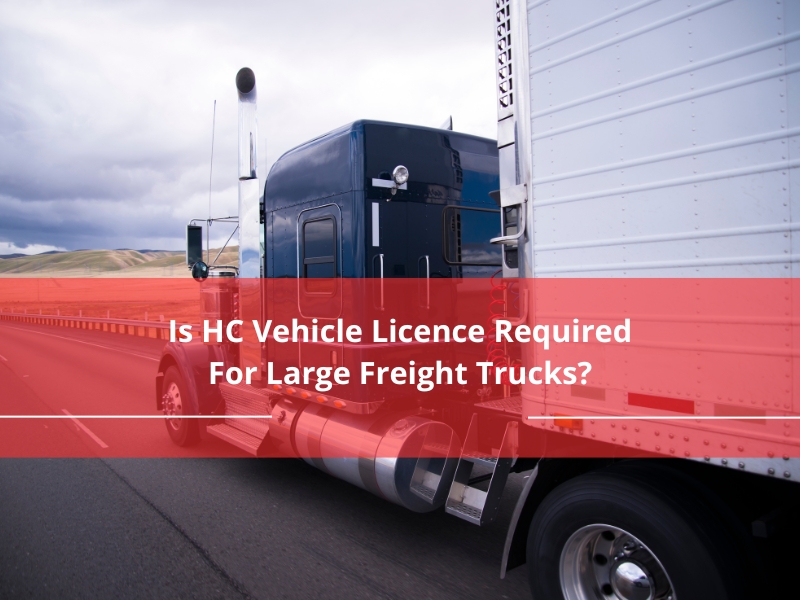Suppose you’re considering a career in truck driving. In that case, you’ve encountered different licences, each suited for specific vehicles. One of aspiring truck drivers’ most common queries is about the Heavy Combination (HC) vehicle licence. Is it required to drive large freight trucks? This guide will explore the ins and outs of the HC licence, why you may need it, and how to get it.
What is an HC vehicle licence?
An HC vehicle licence permits drivers to operate heavy combination trucks. These vehicles are typically more extensive and complex than regular trucks and require advanced driving skills. It is essential for those looking to manage larger, multi-axle trucks.
Do you need an HC vehicle licence to drive a large freight truck?
In short, if you’re planning to drive a large freight truck with a combination of a prime mover and a trailer, you will most likely need an HC vehicle licence. However, not all large trucks require an HC licence. Here are the typical scenarios where you’ll need one:
- Large freight trucks: If the truck you’re operating has a heavy combination of vehicles, such as a prime mover with a trailer exceeding 9 tonnes.
- Freight delivery vehicles: Large vehicles used for long-haul freight deliveries, especially those involving semi-trailers, often require an HC licence.
- Commercial use: If you plan to drive trucks commercially in industries such as construction, logistics, or mining, an HC licence is typically a must.
There are other licence classes for smaller vehicles, like the Medium Rigid (MR) and Heavy Rigid (HR). Still, an HC licence is essential for the most significant trucks used in heavy freight.
What types of trucks require an HC vehicle licence?
An HC licence is a must for a range of truck types. Here’s a breakdown of the vehicles you can drive with this qualification:
- Prime movers with semi-trailers: This is the most common use of an HC licence. These vehicles consist of a truck or tractor unit (the prime mover) towing a semi-trailer.
- Rigid trucks with heavy trailers: Any rigid vehicle towing a trailer weighing more than 9 tonnes.
- Livestock carriers: Trucks used for transporting livestock are often of the heavy combination type and require an HC licence.
- Long-haul freight trucks: Due to their larger capacity, HC trucks are widely used for cross-country or interstate freight delivery.
- Tanker trucks: These trucks, which often carry liquid goods like fuel, are another type of heavy combination vehicle.
How can you get your HC vehicle licence?
If you’ve decided that an HC vehicle licence is the right path for your trucking career, here’s a quick guide on how to get it:
- Meet the eligibility requirements: To apply for an HC licence, you must have held a class C (car) licence for at least two years. Additionally, some states require you to have held a class HR licence for a certain period before upgrading to HC.
- Complete a training course: Truck driving schools offer comprehensive training programs to help you pass your HC licence test. Their experienced instructors guide you through the process, focusing on safety, vehicle handling, and driving techniques for heavy vehicles.

- Pass a practical driving test: Once your HC licence training is complete, you’ll need to pass a practical test, which will assess your driving skills. This includes manoeuvring the truck, reversing, and coupling or uncoupling trailers.
- Obtain your licence: After successfully passing your test, you can apply for your HC licence through your state’s licencing authority. Getting an HC licence often involves meeting strict driver fatigue laws to ensure road safety. These regulations are designed to prevent accidents caused by tired drivers.
What are the costs associated with an HC vehicle licence?
Acquiring an HC vehicle licence does involve some costs. Here’s a general breakdown of the expenses you can expect:
- Training course length and cost: The cost of a training course can vary depending on the program’s size. Some schools offer intensive classes that can be completed in a shorter timeframe, while others offer more flexible options that may be spread out over a more extended period.
- Licence application fee: Once you’ve passed your test, there will be a fee to apply for your licence, which is paid directly to the licencing authority in your state.
- Medical assessment: In some cases, particularly for commercial driving, you may need a medical evaluation to ensure you’re fit to operate a heavy vehicle. This is usually an additional cost.
- Retesting fees: If you don’t pass the test on your first attempt, you may have to pay a fee to retake the practical exam.
Where can you find more information about HC vehicle licences?
If you’re still unsure about the requirements or process for obtaining an HC vehicle licence, here are some essential resources:
- State road authorities: Your local state or territory road authority will have detailed information on licencing requirements, fees, and eligibility criteria.
- Online forums: Trucking communities and forums often provide valuable insights from other drivers who have gone through the process.

Conclusion
Securing an HC vehicle licence is significant for those aiming to operate large freight trucks and advance their trucking career. This licence is essential for driving heavy combination vehicles, including prime movers with semi-trailers and other large freight trucks that require advanced handling skills.
Whether you’re interested in transporting goods across long distances or operating large commercial vehicles, having an HC licence opens up numerous opportunities in the trucking industry.
Ready to take the next step in your trucking career?
If you’re interested in pursuing a career as a truck driver and obtaining an HC vehicle licence, consider enrolling in a reputable training program like Core Truck Driving School. We offer comprehensive training for truck licences, including HC, and strongly focus on safety and student success.
You can become a qualified truck driver with the proper training and dedication. Contact Core Truck Driving School today and take the first step toward a rewarding career in trucking.


